How to Start Prepping With What You Have
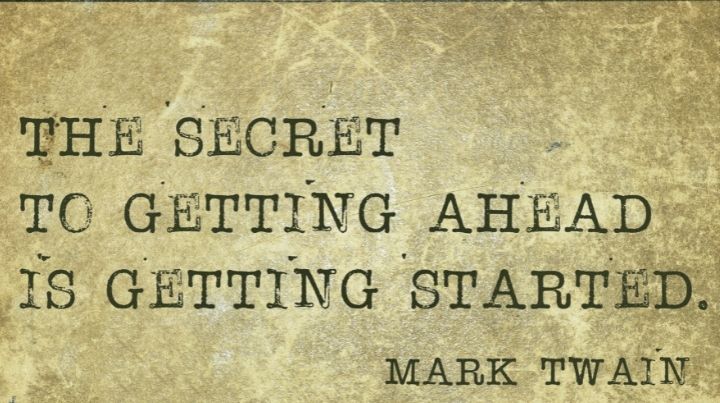

Podcast: Play in new window | Download
by Pete Orndorff
So you think you should learn how to start prepping for SHTF – or at the very least, potential emergencies. You look online, check out social media, and browse some websites. And you go into sensory overload—lists here and lists there. If you're going to start prepping for SHTF, you've got to have this to survive the coming apocalypse, and then you must have to have this other thing to make your life in the woods bearable.
You're wondering what you have gotten yourself into with all this stuff and the expense.
But hold on.
You don't need all the stuff.
You need food and water. And any medications you are on. But guess what? You probably already have nearly everything else to begin prepping for SHTF.
How to Start Prepping for SHTF with Everyday Items
It's not all about the fancy survival gear.
You can use everyday items you already own in a pinch; they may not be thought of as “survival tools,” but they will work. You've been using them for months or years already. Why should they suddenly become obsolete when an emergency happens?
So, take a walk around your home and garage. What kind of stuff can you use, not as a hack, but as the product was meant to be used as? Those everyday items you don't really think about will help you get through those emergencies that pop up.
Knives
Do you need a $300 bush crafting knife, or even a $30 one?
Look in your drawer or knife block; you have knives already. Are they perfect? Nope, but will they work in a pinch? Yep. Will they hold up over a long period of time? It all depends on how you treat them, use them, and maintain them. For the average person, they will last quite some time. Grandpa's 55-year-old Buck knife he gave you on your 16th birthday that you tucked away in your drawer, yep, it's still there. Sharpen it up and put it to work.
You don't need to depend on purpose-made items to get you through a scrap, specialty knives included.
Fire
OMG, how will you start a fire without six months of dryer lint and petroleum jelly? Or a Ferro rod or the knowledge of how to make and use a bow drill?
You will.
You probably have matches or even a couple of lighters stored away somewhere. Many will argue you need a specific skill to make a fire. Yes, you should eventually learn how to do it without modern tools, but a good old lighter or match will work.
And for a little extra tip here, maintaining a fire is as important as getting one started. If you can maintain a steady burn and use your coals correctly, you may not have to light it again for days or weeks. So, round up those matches and lighters and get them organized.
Cooking
Is a lightweight backpacking cook set absolutely needed for your survival? Not in my book.
You have pots and pans. Are they big and bulky? Yep. Will they work? Also yep.
Start a fire wherever you can—inside a grill, in your landscaping using some blocks, out in the middle of the driveway (be careful with asphalt). Remember, this is for survival; it does not have to be pretty to work. Grab a rack from your oven. Use over the flame or preferably the coals once the fire dies down and get to cooking some of that meat that is rapidly defrosting. Call the neighbors over to the house; make it a good time in the middle of a crappy one.
YOU do not need the latest ultra-lightweight cook set. If you're wondering how to start prepping for SHTF-style cooking, you'll probably find that you already have much of what you need.
Bug Out Bag
The most talked-about item or tool, the one pushed aggressively on just about every survival/prepper group, page, or website, is the BOB or Bug Out Bag.
Should it be a top priority for your well-being and safety? Not really. You don't need a fancy BOB, filled to the brim with survival gear first thing.
Why not?
Well, I look at it this way: have I ever needed one yet, in my entire life? I have not, and most likely, neither have 99% of people. I'm not including professionals here, those who have to leave on short notice for their profession.
What about the regular everyday Joe and Jane Doe? You probably have a suitcase, a duffle bag, or an empty backpack lying around, so, at least to get started, use that. There are very few reasons why you would need to take off in mere seconds from your home. And unless your BOB is by the door or in your car, you'd probably forget it anyway.
So, right now, make a mental list of items you'd need to take off for a couple of days. Think along the lines of a three-day weekend at a hotel. You probably don't need to include a bathing suit, but if you want to, go ahead.
Gear for Your Bug Out Bag
What about those survival items pushed by survival gear sites—the water purifier, fishing kit, shelter, and 550 cord? Are you going to need them, right now, next week, next month? Probably not. Should you get them at a later date? When all the stuff you have been bombarded with for the last couple of weeks dies down, sure. But take your time; get the right items for you and your potential situation.
Next, there's one more tip about bags. Gather your items together and measure them. Get a cubic inch amount and look for a bag just a little bit larger than that figure. Do not buy a bag and fill it, because you will end up with lots of stuff you won't need. Make that bag the right tool for you at the right time. Forget about rushing out and buying all the best survival equipment money can buy just to toss it in the corner.
Free First Aid Kit
A first aid kit or even a partial trauma bag is something you should have. But when figuring out how to start prepping for SHTF medical care, you probably have quite a bit of the content already on hand, like most of the items already mentioned. The items just may be spread out all over—from the hall closet to the bathroom drawers and cabinets or even the car.
So, collect what you have, take stock of it, try to get it all into one space or two. Ideally, it would be best if you had something in the car and in your home. Then go out and get what you are missing.
As far as training, this is one area you should not skimp on. Find a basic First Aid class in your area, learn CPR, or do some of it online, but do get the basics. Collect up those first aid items and put a little kit together. Learn how to use those items properly.
Bartering
As you discuss with others what life might be like following a breakdown of society, you will undoubtedly hear about the possibility of having to barter items.
Forget about that for now.
No one understands bartering, really. They are guessing for the most part. Even people who have been through actual SHTF events don't recommend stocking items for barter. It would make no sense for you to stockpile items to trade to a stranger at a later date when you don't even have the basics for yourself covered. It's just a bad idea. So put aside the idea of stockpiling goods to barter, possibly forever.
Food and Water
Now, let's look at what you really do need: food and water.
Some general rules of thumb are used here. You can only live 30 days without food, three days without water, and 3 minutes without oxygen.
We aren't worried about oxygen at this time, but 30 days without food isn't living to me. Probably halfway through that or even sooner, you'd be a hurting unit. Don't test it. Three days without water, the same thing. Now to set this straight, by water, they mean liquids that replenish the body. I don't drink much “water,” drinking instead milk, juices, pop (yes, I know), and a few other things.
Alcohol can count somewhat, but it can be bad for you in a time of stress, and it lacks nutrition. Worse still, it has a dehydrating effect on the body.
You can also get some of those liquids from the foods you eat. Is it enough? Doubtful, that's why the cup was invented.
Store What You Eat
Now, what are the foods you should store?
Ideally, you should be storing the foods you eat every day. You are used to them, you like them, and your body won't go, “Whoa, wait a minute, what is this crap you are feeding me?” And it won't decide to shut you down or accelerate the expulsion of your bodily waste. Both of those functions are very important, not only in your daily life but especially during times of high stress and the unknown.
Do you need “survival food”? No, not really. It might be light and premade, but it's also expensive, high in sodium, and low in calories. And unless you eat them occasionally, thus taking away from your precious survival stash, your body will probably revolt against you once you do start eating them. By eating them regularly, you are spending lots of money to replace that stock. So the best recommendation for your primary food storage is the basic everyday items you already consume.
The simplest advice for how to start prepping for SHTF and build a food supply is to stock what you already eat.
Longer-Term Food Storage
There is one problem with this premise of storing what you eat. Americans like a lot of ready-made food, like stuff from the freezer. If your diet revolves around frozen pizza and microwaveable “TV dinners,” you are giving yourself a few extra steps to maintain that lifestyle, albeit for a short time, before you run out. You'll need power. Thawed out pizza doesn't last very long, and neither do the other entrée type things. They aren't made to last, but instead, they are made to be frozen right up until cooking time.
Canned and dry goods are the best bet for maintaining a regular diet and are easy to store. Soups, stews, pasta and sauces, vegetables, fruit, and condiments are in a lot of people's diets, and they are just sitting there on the shelf to purchase. Plus, they have pretty good shelf lives, most around the 2-year mark. Canned meats, vegetables, and sauces give you a good mix for variety.
You can make multiple tasty meals from the same ingredients if you use different spice blends. So that means along with your food, you should have a tasty variety of spices. It will help with not getting bored with the same food over and over. Get away from that ready-made frozen food and get some shelf-stable canned and dry goods in your cupboards and pantry. Check out this three-layer food storage plan for more ideas.
Specialty Gear
Now, does this mean you absolutely shouldn't buy any of that specialty survival equipment?
If you feel the threats to you are minimal, then sure, the stuff you already have on hand should get you through what you may face. If the threats you are preparing for could potentially last a long time or push you to the limits, then you should eventually start adding more specialized tools built to be used more aggressively and for long periods of time.
Take your time, choose wisely, and really think about whether you need one item over another. Look at quality gear. The expense may be an issue, but remember, you already have that item covered. You just want something now that is a bit more rugged. Build those kits for you and your family based on your skill set and their abilities. Get the right equipment for you.
Relax
When you think about how to start prepping for SHTF, slow down. Take your time and figure out what to have on hand to make any situation EASIER on you and yours.
Figure out the most likely scenarios you'd face. Here's a hint: it isn't war, famine, or governmental collapse. Think about real-life instead of fantasy. Think about the stuff that happens every day by those around us, like losing a job, long-term illness, a house fire, or adverse weather.
If you prepare for job loss, power outages, and potential loss of your home, then guess what?
You are significantly better prepared for those fantasy situations we all discuss. So relax, take a breath, and don't lose sleep over worrying about tomorrow.
The Bottom Line on How to Start Prepping for SHTF
Prepare for you. Only you know your needs, wants, and desires. Only you know the specific requirements of your family members and loved ones. Please help others by keeping your cool and by helping them maintain theirs.
Stuff is stuff, stuff is cool, and I like stuff. But make sure you have plenty of the basics before you go crazy on the specialty items.
Food and water are the only stockpiled items you need to work on currently.
Get started with that, and go from there.
If you have any other thoughts or questions about how to begin prepping, please leave a comment below.
Related Articles
FREE Guide
Read the Best Seller
Join Mind4Survival
Stay informed by joining the Mind4Survival! 100% Secure! 0% Spam!
Affiliate Disclosure...
Mind4Survival is a free, reader supported information resource. If you make a purchase through our link, we may, at no cost to your, receive an affiliate commission.
Do You Want To Be Ready No Matter What?

Download our free 39-page guide with interactive, 7-Day Emergency Kit Checklist and take the first step toward real preparedness.
- Know exactly where to start.
- Save time and money.
- How-to build a complete Basic Emergency Kit.
- Level up your safety and security.
Join Mind4Survival
Stay informed by joining the Mind4Survival! 100% Secure! 0% Spam!

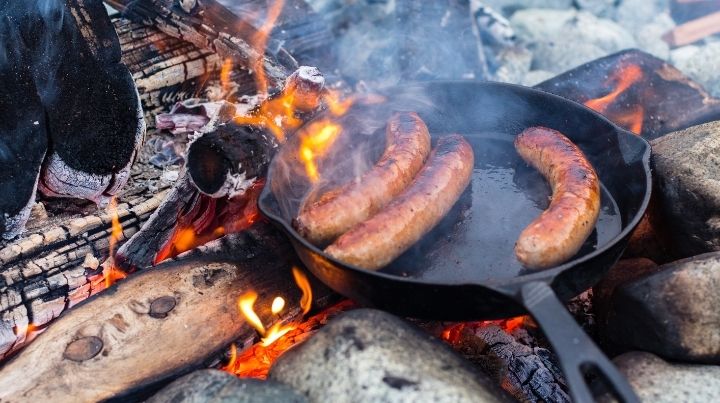
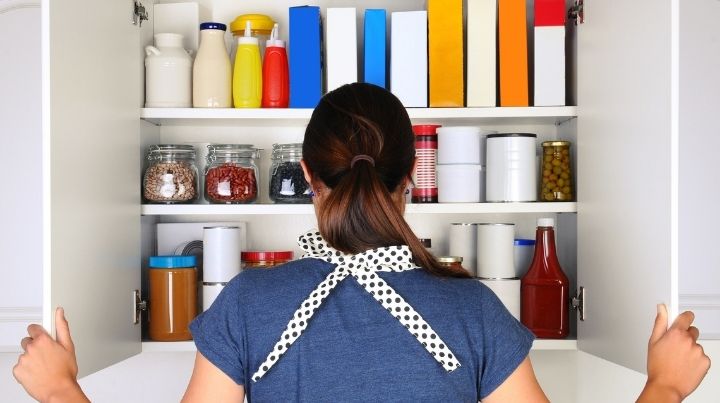

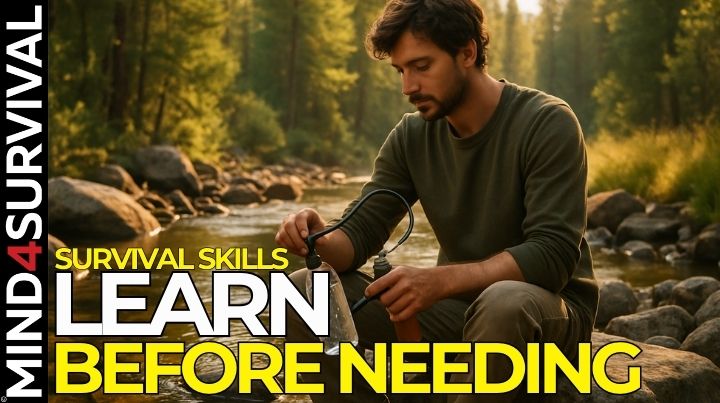
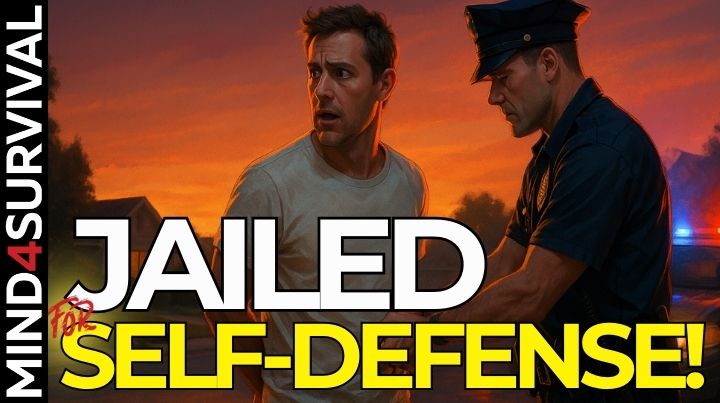


Oh the common sense you have infused this article with! Thank you for putting stuff in perspective. It has been my mindset for a while to focus on sheltering in place and food/water storage. I have felt overwhelmed by “all the other stuff”. I’m going to save this article to keep me on target.
Hi JoEllen,
Thanks for such wonderful feedback! You made an already nice afternoon even better.
I’m sorry to hear you’re feeling the totally normal prepper overwhelm. I think I’d be more concerned if you didn’t feel it. What part of it all is most overwhelming for you?
Stay safe,
Brian
I tuned out the sensational and the “you gotta get this” pressure and 2 years have passed. I don’t feel overwhelmed. I have been able to sort out most of what we really need and we have a plan in place. I wish I had realized a long time ago that it is mostly common sense! Prepping for us is mostly a shelter in place plan but we have a plan if we have to leave for some reason. No electricity is covered as is our need for shelter and warmth. We have been able to collect ancillary gear to facilitate sheltering in place as well as food, water. You can never feel totally prepared but we’re in a pretty stable place prepperwise. Thanks for your articles and this website. It has helped a lot!
Finally, a little common sense in the chaos of selling us everything under the sun, and making us to believe “we” MUST have “it” to survive. Thank you for a GREAT message.
Lola,
Thanks for your great feedback. I’m totally stoked it made sense and helps.
I appreciate that you took the time to write. Thanks, so much!
Stay safe,
Brian
I loved this article, practical prepping! I’ve listened to Duff n Dale for a year, and always enjoy it! Thank you!
Just listened to this one. Great topic and perspectives on it!
For sure starting with what you have and then build from there. As you build your preps, look towards second hand shops and thrift stores. You can pick up a lot of stuff without spending a lot. Like working with what you have in the house already, you may find yourself having to think of things from a different angle to see how what you already have will work for you.
If folks are into camping and backpacking, well, there’s a source for some preps right there!
Love the podcast, man. Keep it up!
So Glad you are BACK !
I’d been missing the more balanced common sense answers to the lifestyle.
Thanks, Nate!
Thank goodness! Finally a down to earth,sensible article on prepping. Good on you!!!
Thanks for taking some of your valuable time to leave us excellent feedback! Much appreciated! ~Brian
Awesome website. I am leaning so much
Brian, I appreciate your common sense approach to things..I would, however, not write off barter to any great extent. I know, lots of folks have this lollipops and rainbows view of post – SHTF situations where everybody gets along,etc. It probably won’t be that happy all the time, but barter may be a useful way of getting along when needed.